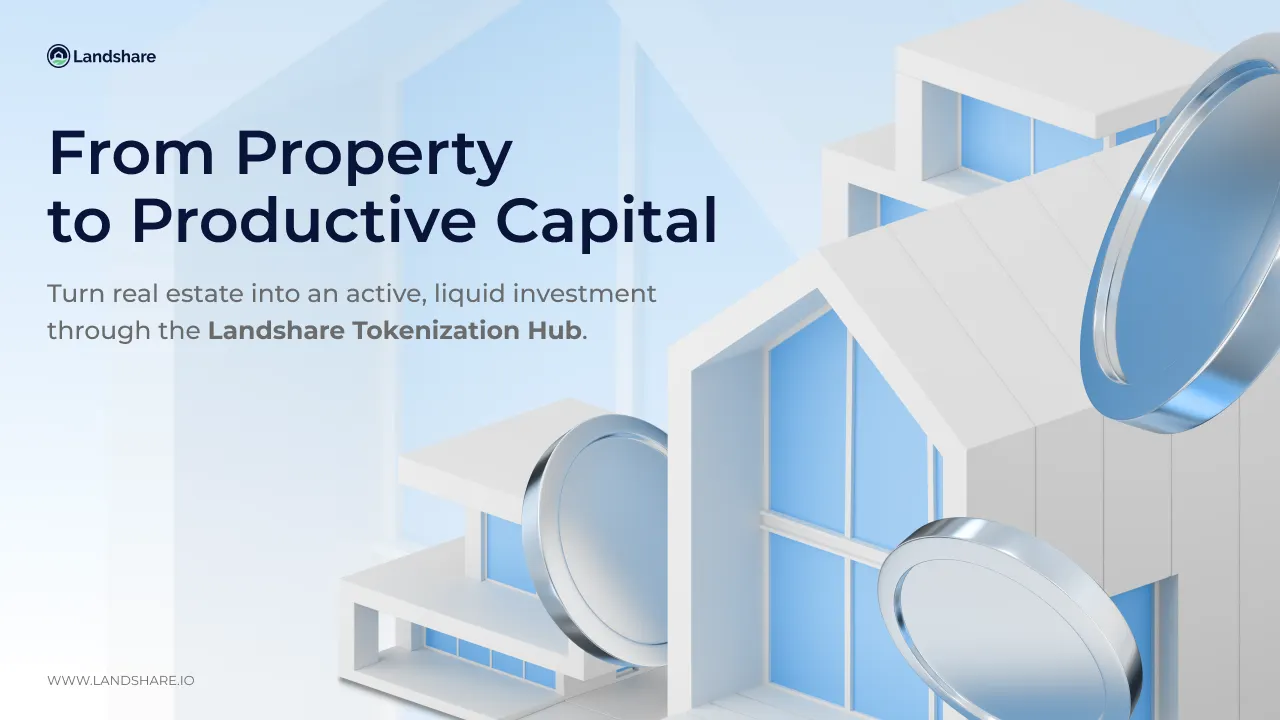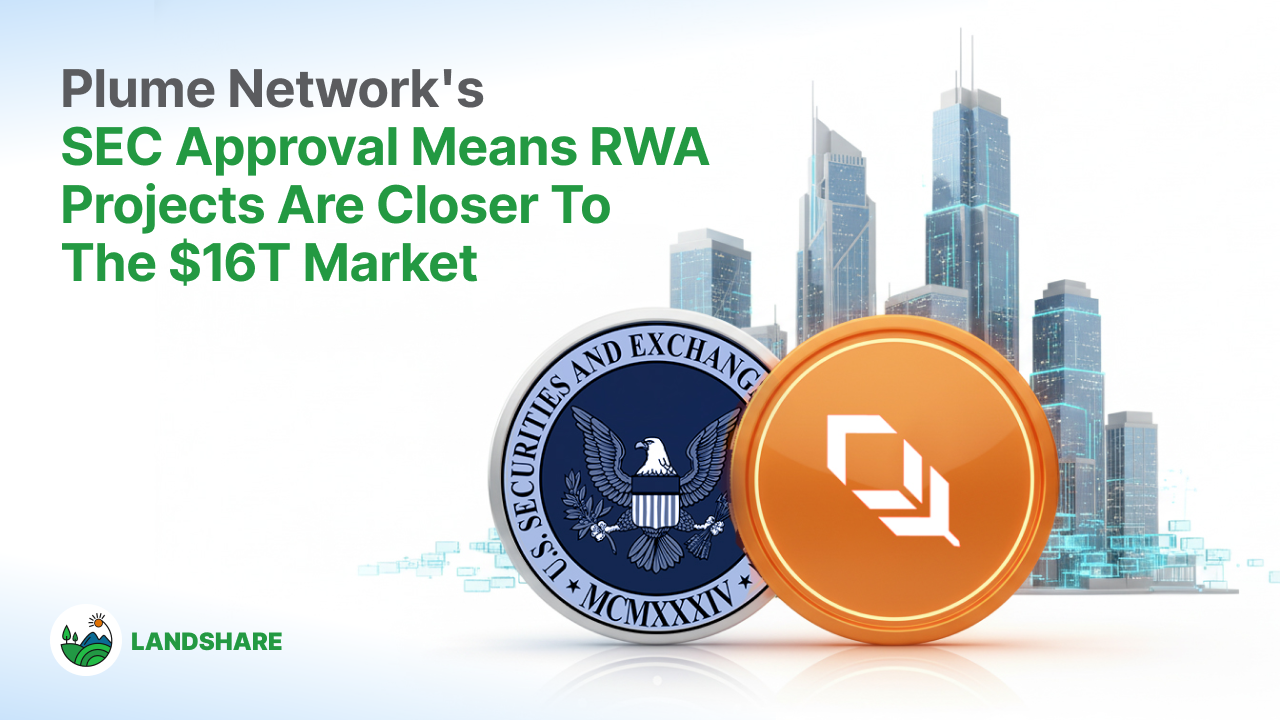Beyond Traditional Boundaries: The New Era of Real World Asset (RWA) Tokenization
Landshare Team

The world is moving fast and every now and then we see disruption in traditional industries by emerging technologies. Blockchain is undoubtedly a state-of-the-art technology which is changing the landscape across the industries. It keeps changing the fundamental operations and bringing better and efficient solutions. Tokenization of Real World Assets (RWAs) is possible due to blockchain technology and is on the way to becoming a trillion dollar industry.
The RWAs could include a wide range of assets from the tangible financial or traditional physical world including real estate, commodities, artifacts, or even the digital tokens, the list goes on for real world assets. Although we are witnessing that the tokenization sector is on boom and spreading across different sectors, it is making a notable difference in real estate. A significant number of projects have surfaced in recent years that focus on tokenization of the real estate sector.
Industry experts have recognized tokenization as an enterprise blockchain solution with huge potential in the future. Co-founder of crypto exchange Coinbase Fred Ehsram quotes that “Everything will be tokenized and connected by a blockchain one day.”
Tokenization of RWA
Tokenization is a process of representing the value of real world assets on blockchain. When an asset is represented as a digital token that can be exchanged and kept on a blockchain, this process is known as tokenization. We do not need middlemen, while secure and transparent record-keeping is made possible by distributed ledger technology, or blockchain.
Real World Assets (RWAs) includes tangible assets such as real estate properties and art pieces, financial instruments such as commodities, bonds, and equities and intangible assets intellectual property, data and identity.
Data suggests that RWA tokenization emerged as a fast-paced segment across the DeFi space. According to DefiLlama, in December 2023, the RWA tokenization was sitting on total value locked (TVL) of around $5 Billion.
Increased liquidity, fractional ownership, and easier transferability are just a few advantages that blockchain-based tokenization offers over conventional asset ownership and trade. Tokenized assets can be exchanged anywhere in the world, at any time, and without middlemen, which lowers expenses and expands the pool of possible investments.
Process of RWA Tokenization
Though tokenization is a typical procedure with technological aspects, still here we try to give a simple explanation. The tokenization process begins with determining the best method to digitize the chosen asset, which varies based on the asset's nature, such as a money market fund versus a carbon credit, and its classification as either a security or a commodity under relevant laws.
Next, if the asset has a tangible form, it is secured in a mutually agreed-upon location. Following this, a token representing the asset is created on a blockchain, with necessary compliance measures in place. This digital asset is then ready for distribution, requiring investors to use a digital wallet for storage and possibly trade on a secondary market with less stringent regulations.
Post-distribution, the asset undergoes continuous management, including compliance with legal and financial reporting, to ensure its integrity and value are maintained.
Benefits RWA Tokenization Brings To The Table
RWA Tokenization is taking the world by storm and there are a number of reasons behind it in the form of benefits and offerings. It solves many inherent issues across the sectors along with bringing new age solutions. The solutions not only saves cost and efforts but end up making the traditional procedure more efficient and easy. Let’s talk about the advantages of RWA tokenization in depth.

Accelerated Settlements Through Constant Availability: Traditional financial settlements typically take up to few business days to complete, allowing time for all parties to prepare necessary documents and funds. Tokenization enables immediate settlements, offering potential savings, especially in environments with high interest rates, by facilitating round-the-clock transactions.
Reduction in Operational Expenses with Programmable Assets: Tokenization brings significant cost reductions in asset management, particularly for assets that traditionally require extensive manual intervention, like corporate bonds. By integrating functions such as interest computation and payment distributions into a token’s smart contract, these processes become automated, minimizing the need for manual oversight.
Opening Investment Opportunities to a Wider Audience: The efficiency gained from automating complex and labor-intensive processes makes it financially viable to serve a broader range of investors, including those with smaller capital. However, for this democratization to fully materialize, the distribution of tokenized assets must expand substantially.
Boosted Transparency Through Smart Contracts: The deployment of smart contracts, which are self-executing contracts with the terms of the agreement directly written into code, enhances the transparency of transactions. For instance, in the case of tokenized carbon credits, the blockchain can maintain a clear, unchangeable record of the credits' ownership and transactions.
More Flexible and Cost-effective Infrastructure: Leveraging blockchain technology, which is open source by nature, results in a more adaptable and less expensive infrastructure compared to traditional financial systems. This aspect of blockchain facilitates quicker adjustments to meet evolving regulations or operational demands.
Trends and Developments In RWA Industry
The landscape of RWA tokenization, or digitizing tangible assets through blockchain, is at a foundational stage with a promising outlook. As the underlying blockchain technology evolves and legal frameworks become more defined, this area is poised for notable expansion. RWA tokenization issuance is forecasted to reach $4 to $5 trillion by 2030.

Here's a snapshot of emerging trends in the realm of RWA tokenization:
Wider Acceptance: Anticipate a surge in the embrace of this innovation across diverse industries. Companies leveraging this approach stand to gain by making assets more liquid, slashing operational expenses, and widening the pool of potential investors.
Legal Frameworks Gaining Shape: The growth trajectory of RWA tokenization hinges on clear legal guidelines. Authorities are progressively understanding the value of these digital assets and are crafting laws to safeguard investors while promoting creative advancements.
Cross-Platform Exchangeability: The fluid exchange of tokenized assets among various blockchains and platforms is essential for the sector's vitality. Efforts are underway to establish norms and protocols that enable such seamless transfers, aiming to boost market liquidity and effectiveness.
Security Enhancements: With the rise in the value of digital assets, enforcing stringent security protocols is becoming increasingly crucial. Cutting-edge solutions, including decentralized verification and layered authentication measures, are being developed to fortify the safety of these assets.
DeFi Convergence: The intersection of RWA tokenization with the burgeoning sector of DeFi heralds the creation of innovative financial mechanisms. This amalgamation is set to offer unprecedented opportunities for decentralized financial activities, from lending and borrowing to generating passive income.
These evolving dynamics suggest a transformative phase for the tokenization of real assets, promising to redefine the contours of asset management and investment through increased accessibility, security, and market fluidity.
Industries With Growing Interest in Tokenization
There are a number of industries that saw a significant interest in tokenization of assets. The real estate sector has swiftly acknowledged the advantages offered by tokenizing. Transforming tangible real estate into digital tokens enhances trading efficiency and liquidity. This innovation provides investors with fresh opportunities, reduces entry obstacles, and enables partial ownership of premium properties.
In addition to real estate, tokenization is transforming investment in art, collectibles, private equity, commodities, and venture capital. It democratizes access to high-value art and collectibles by allowing fractional ownership through digital tokens, enhancing portfolio diversification.
In private equity, it streamlines capital raising and increases asset liquidity, making it easier for investors to trade shares in private companies. For commodities like gold and oil, tokenization offers a simplified trading mechanism, bypassing the need for physical handling. In venture capital, tokenizing startup equity facilitates capital raising and provides early-stage investors with liquidity, allowing them to realize returns without waiting for traditional exit events.
Avalanche is emerging as a key player in the RWA tokenization space, attracting major banks like JP Morgan, Citi, and Bank of America. These institutions are leveraging Avalanche's technology and Subnets to develop blockchain solutions for tokenizing funds, facilitating forex trades, and exploring broader asset tokenization opportunities.
Chainlink plays a crucial role in the tokenization of real-world assets, offering transparency, cost-effectiveness, and accessibility in financial transactions. Research by K33 highlights Chainlink's LINK as a secure choice for investors interested in RWAs' tokenization. Chainlink's platform enables the enrichment of RWAs with real-world data, secure cross-chain transfers, and connection to off-chain data, making it a key player in this emerging landscape.
Growth Of Real Estate Tokenization And Emerging Players
The real estate sector market is one of the fastest growing industries worldwide. Statista report states that in 2021, the global real estate market size stood at $585 Trillion. It is expected to be a staggering $729.4 Trillion in 2028 with a CAGR of 3.4%.

Given the sheer size of the industry, tokenization of real estate has a huge potential in the near future. There are several projects already active in the space leading the way for the industry. We at Landshare intend to unlock the vast prospect of real estate for the masses.
Landshare stands out in the real estate tokenization sphere through its innovative and reliable unique selling points. Our ability to successfully sell three properties via the Binance Smart Chain (BSC) highlights our operational proficiency and the market's endorsement of our approach.
The introduction of our Real World Asset (RWA) token, Landshare RWA ($LSRWA), opens up new opportunities for investors aiming for diversification and passive income. This token allows investors to access a selection of properties. Our platform's functionality and transactions are significantly supported by our native utility token, $LAND.
Beyond the fundamental benefits of tokenized real estate, we offer additional perks that enhance its appeal. Holding $LAND enables us to offer investors returns over 12%, while participating in $LAND-$BNB LP stake can yield rewards as high as 66%. Landshare's commitment to innovation, security, and profitability continues to propel us forward in the tokenized real estate market.
Real estate tokenization transforms property investment and management through several key benefits:
Enhanced Liquidity: Tokenizing real estate allows for the fractional buying and selling of property interests, significantly increasing market liquidity. This process enables smaller investments and makes it easier for owners to sell parts of their assets quickly, offering flexibility previously unseen in the traditional real estate market.
Accessible Fractional Ownership and Diverse Portfolio Opportunities: Democratization of real estate investment becomes possible by lowering entry barriers and enabling portfolio diversification across various properties and locations, thus reducing risk and potentially enhancing returns for a broader investor base.
Participation in Global Real Estate: Tokenization erases geographical boundaries, enabling global investment in local real estate markets. This not only broadens the investor base but also injects foreign capital into markets, potentially stabilizing property values and encouraging economic diversity.
Efficiency, Transparency and Low Transaction Fees: Tokenization enhances transaction efficiency, reduces costs, and speeds up processes by eliminating traditional bottlenecks and paperwork. It ensures transparency, recording every transaction to minimize fraud risks, thereby building investor trust. Additionally, it cuts down on intermediary fees, making investments more accessible and profitable.
Simplified Asset Management: Digital tokens simplify the management of real estate assets, from leasing to maintenance and sales. This efficiency reduces administrative burdens and costs, potentially increasing the profitability of real estate investments.
These advancements collectively represent a significant shift in how real estate is viewed, traded, and managed, offering unprecedented opportunities for investors and transforming the real estate landscape into a more inclusive, efficient, and secure market.
Closing Thoughts
The tokenization of Real World Assets (RWAs) represents a groundbreaking shift in how we view and manage assets across various industries. With its roots deeply entrenched in blockchain technology, tokenization is paving the way for a more efficient, transparent, and accessible market. The real estate sector, in particular, has seen a remarkable transformation through tokenization, offering benefits like increased liquidity, fractional ownership, and global participation. As we look towards the future, the potential for tokenization extends far beyond real estate, touching every corner of the investment world from art and commodities to intellectual property.
Landshare's initiative in real estate tokenization exemplifies the practical application and immense potential of this innovation, demonstrating how traditional barriers can be dismantled to unlock new investment opportunities. With the global real estate market poised for significant growth, the role of tokenization will undoubtedly expand, bringing with it a host of advancements in how we buy, sell, and manage assets. As industry leaders and pioneers continue to explore and invest in tokenization, the landscape of asset management is set for a revolution, making investment more democratic, secure, and efficient for all.
Landshare October Recap
Landshare Team
October was a milestone month for Landshare – one that set the stage for the next era of on-chain real estate. From the official Landshare v2 announcement to new ecosystem updates, governance decisions, and exciting community initiatives, we’ve laid the groundwork for a future defined by growth, utility, and innovation.
This month, we introduced the framework that will redefine how investors, property owners, and DeFi users interact with real estate on-chain. Let’s recap the highlights 👇
Landshare v2 Announcement
The official unveiling of Landshare v2 signaled the start of a new chapter – one built around real utility, real yield, and real scalability.
Landshare v2 isn’t just an upgrade. It’s the foundation of a self-sustaining ecosystem where tokenized real estate finally reaches its full potential. The new system transforms stable assets into active yield-generating opportunities, seamlessly connecting traditional markets to DeFi.
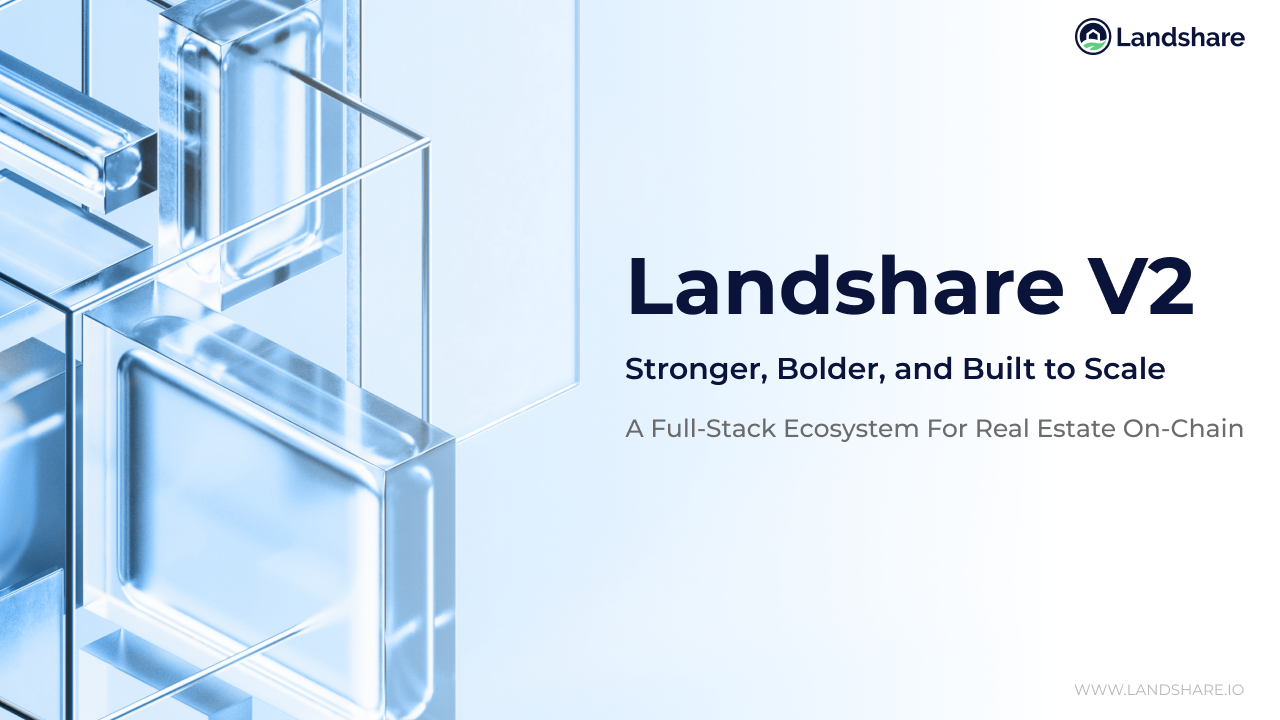
The Three Pillars of Landshare v2
In our follow-up deep dive, we explored the three core pillars that form the foundation of Landshare v2:
- The Real Asset Vault (RAV): A seamless gateway for stablecoin holders to earn real yield backed by tokenized properties.
- The Tokenization Hub: A complete solution for property owners to bring their assets on-chain.
- The DeFi Suite: Tools and incentives that amplify participation and utility across the ecosystem.
Together, these pillars create a self-sustaining growth loop, where every user and property strengthens the entire network.
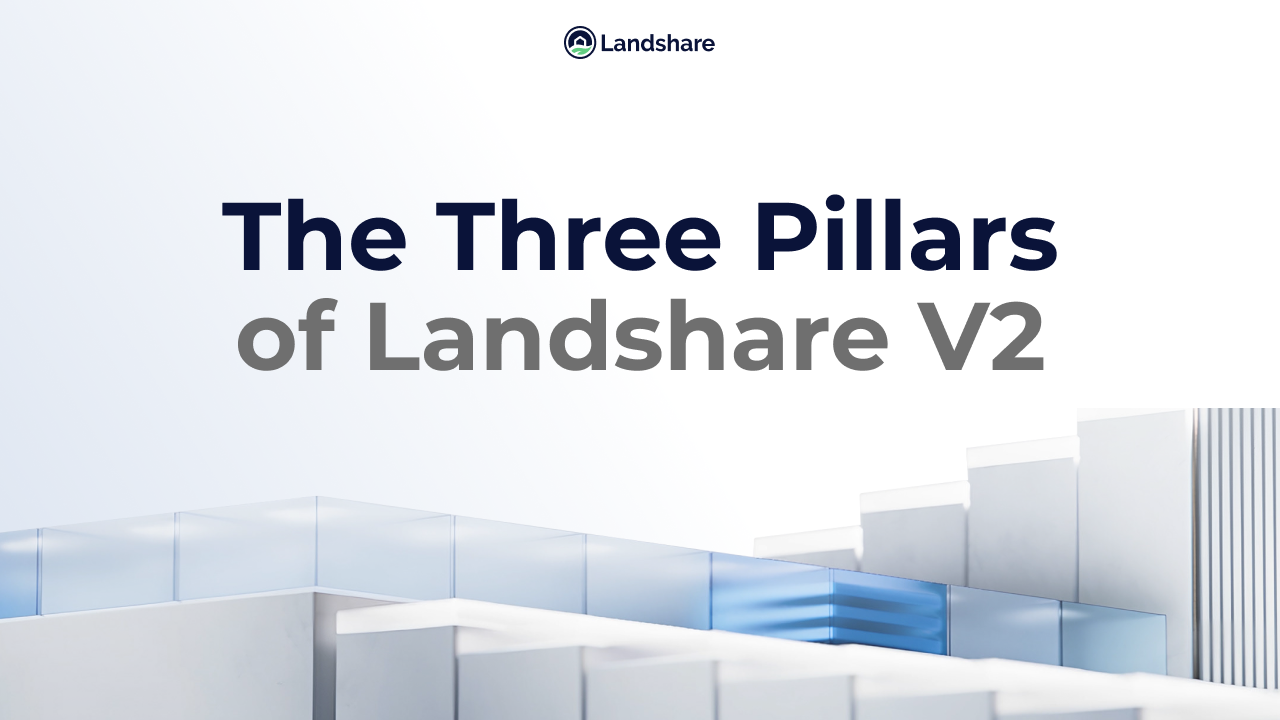
DAO Proposal Passed
In late October, the community voted to reduce LP emissions by 50% across both the LAND–BNB and LSRWA–USDT pools – with the proposal passing at 62.28% in favor.
This important step helps:
✅ Reduce daily LAND inflation
✅ Strengthen token scarcity and price stability
✅ Extend the reward pool lifespan
✅ Encourage long-term liquidity participation
The change will take effect within 48 hours of approval and marks another move toward a more balanced, sustainable economy for Landshare v2.
🗳️ View the full proposal and results
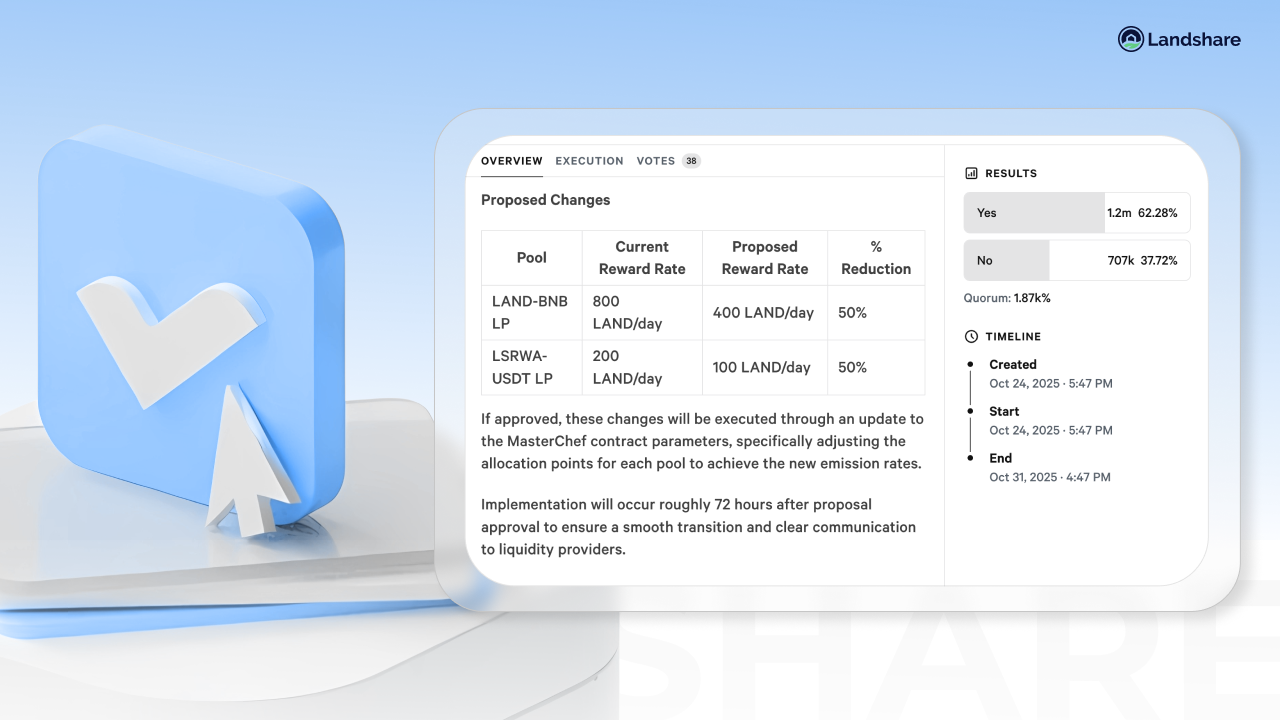
Tokenization Hub Breakdown
We released a comprehensive guide to the Landshare Tokenization Hub, explaining how property owners can now go beyond simple tokenization to access real investors, liquidity, and on-chain utility.
The Hub bridges traditional real estate with blockchain finance – creating a pathway for real-world assets to generate ongoing yield, transparency, and accessibility.

4.5M+ LAND Staked
October also marked another key milestone – over 4.5 million LAND tokens (nearly half of the total supply) are now staked in vaults. This incredible community achievement reflects growing confidence in Landshare’s long-term vision and token utility.
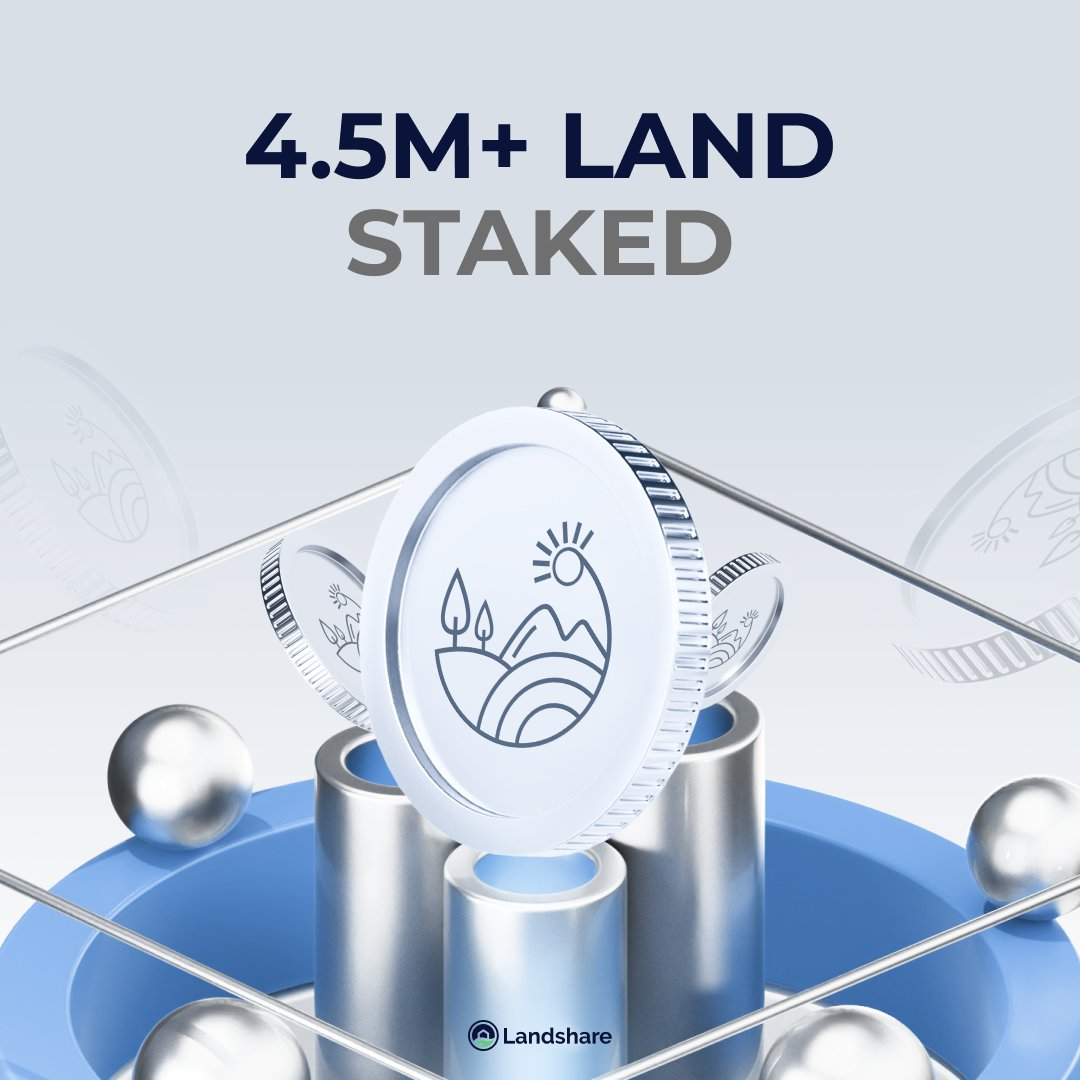
Community Townhall Incoming
We’re excited to announce our next Community Townhall, happening Thursday, November 6 at 12 PM CST or 6 PM CET on X Spaces!
Join Jordan (CEO), Travis (Co-Founder), and Ivan (CMO) as they discuss everything happening with Landshare v2, recent DAO proposals, and take your questions live.
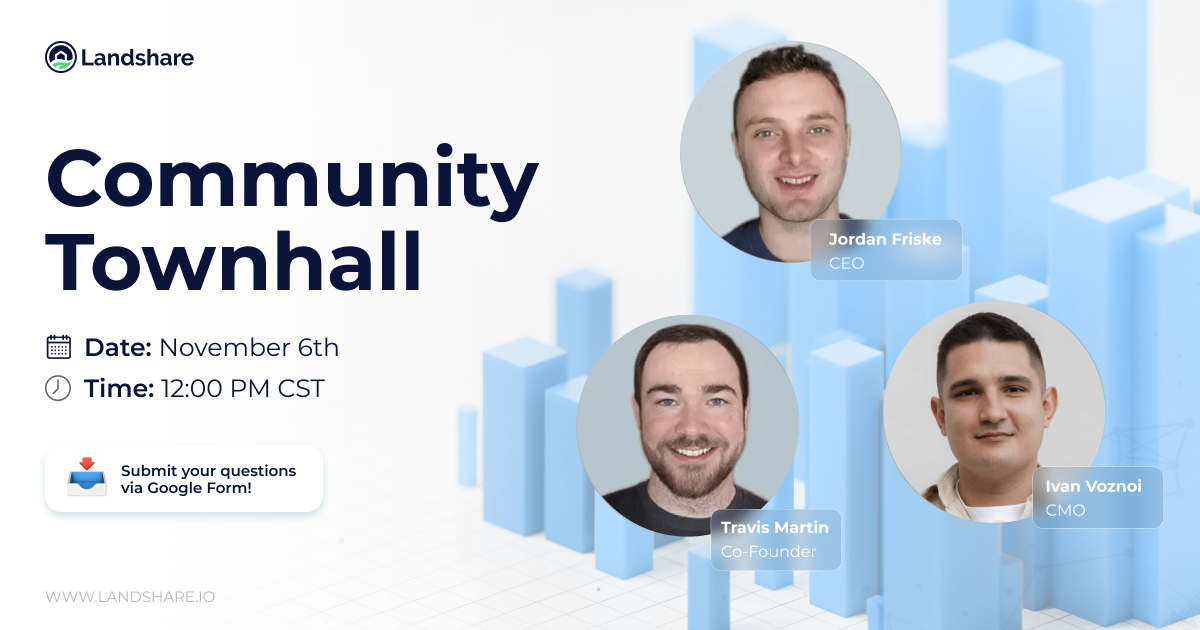
Looking Ahead
With Landshare v2 on the horizon, the foundation is set for a new phase of growth and adoption. In the coming weeks, we’ll be sharing more details on the RAV launch, the Points Campaign, and other major milestones driving our ecosystem forward.
Stay tuned – the future of real estate is being built on-chain, and we’re just getting started.
Tokenization Hub Breakdown
Landshare Team
Real estate tokenization has been a buzzword for years. Yet in practice, most projects have failed to move beyond press releases and empty promises. Too often, blockchain has been used as a veneer to package illiquid or low-quality assets, leaving investors with tokens that serve little purpose and property owners with no meaningful results.
Without investors, liquidity, or secondary markets, tokenization becomes little more than an on-chain spreadsheet — a digital record of ownership that no one can trade or invest in. For property owners, that means time and money spent “tokenizing” without achieving key goals: raising capital, expanding visibility, or unlocking value.
A Smarter Path Forward
For real estate tokenization to truly work, it needs to deliver tangible investment outcomes. After years of building and refining on-chain real estate products, Landshare has developed a model designed to do exactly that.
The Landshare Tokenization Hub transforms tokenization from a passive concept into an active investment process — connecting high-quality properties with real investors, liquidity pathways, and a live blockchain economy.
The Tokenization Hub Solution
Most platforms stop once a token is created. Landshare’s Tokenization Hub goes further , offering a complete pathway for property owners to bring their assets on-chain and immediately engage investors.
Each project is structured for success from day one, with:
- Customized tokenization models tailored to each property
- Transparent fundraising mechanics with defined soft and hard caps
- Built-in integration with the broader Landshare ecosystem
By connecting directly to Landshare’s existing network of investors and DeFi infrastructure, offerings can attract participation as soon as they launch. Once a fundraising goal is met, property tokens are deposited into the Landshare RWA Pool, linking them to ongoing liquidity, yield mechanisms, and secondary market exposure.
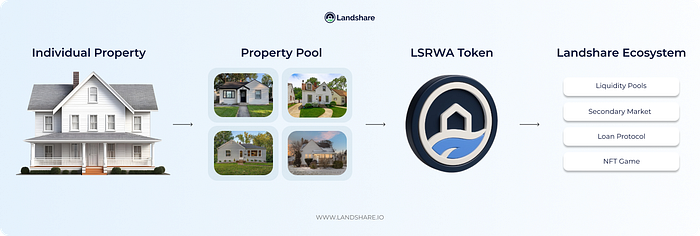
Why This Model Delivers Real Results
Where others leave property owners to manage marketing, compliance, and liquidity alone, the Tokenization Hub handles these as part of a unified process. This integration dramatically increases the likelihood of meeting fundraising goals and sustaining long-term engagement.
Integration with the Landshare RWA Token (LSRWA) is central to this model. Rather than isolated tokens with no market, each property becomes part of a shared, liquid environment that generates yield and investor participation. Individual assets can still be represented, extracted, or traded independently when needed.
For example, a multifamily property owner might tokenize 20% equity to raise $500,000 on-chain, connect the asset to the RWA Pool for ongoing yield, and maintain full transparency for investors — all within a compliant, accessible framework.
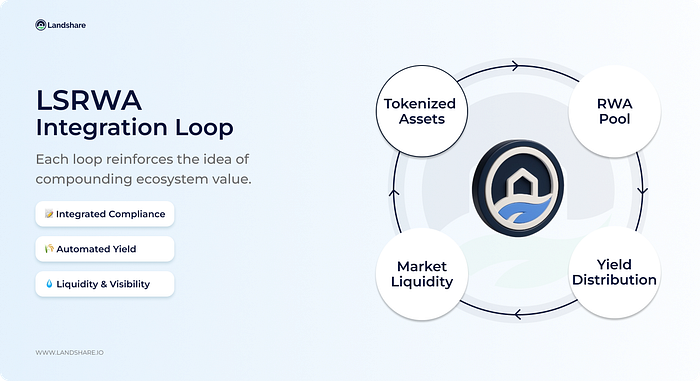
How It Works
- Tokenize the Property: Landshare collaborates with property owners to create a digital representation of equity, income rights, or hybrid participation.
- Launch the Offering: The property is listed on the Tokenization Hub with defined terms, caps, and transparent investor access.
- Fundraising & Validation: Investors participate directly on-chain. Once the soft cap is reached, funds are secured and the offering is finalized.
- Ecosystem Integration: Tokens are deposited into the Landshare RWA Pool, and investors receive LSRWA tokens representing pooled value and yield potential.
- Ongoing Value Creation: Property owners gain lasting benefits through liquidity, visibility, and investor engagement. As new assets are added to the pool, owners can rebalance between equity and cash, making real estate a more dynamic and liquid asset than ever before.

Built for Real-World Impact
The Landshare Tokenization Hub is more than a technical service — it’s a complete ecosystem designed to make real estate investment active, liquid, and accessible.
For property owners, it offers a streamlined way to raise capital and connect with global investors.
For investors, it provides exposure to yield-generating, on-chain assets backed by transparent real-world value.
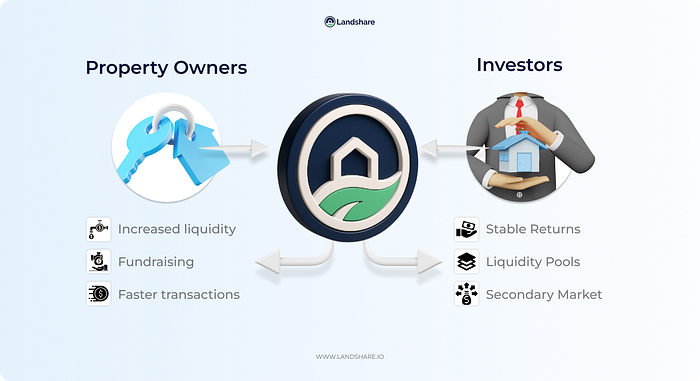
In an industry crowded with static tokens and overhyped promises, the Tokenization Hub delivers what tokenization was always meant to achieve — real outcomes, real liquidity, and real-world results.
🏡 About Landshare
Landshare is a tokenized real estate ecosystem that enables seamless investment in real-world assets on the blockchain. With Landshare, you can own a share of a real-world property simply by holding our RWA Tokens ($LSRWA). Our platform offers a secure, transparent, and efficient way to invest in real estate without traditional barriers.
- Website: landshare.io
- Twitter: @Landshareio
- Community: t.me/landshare
Plume Network's SEC Approval Means RWA Projects Are Closer to the $16T Market
Landshare Team
On October 6, Plume Network announced on its social media that it had been approved to be an SEC-registered transfer agent. This is a big milestone for the RWA industry, signaling that the traditional financial system is welcoming tokenized assets.
Transfer agents basically manage important back-end work and are the official record-keepers for securities issuers. So, essentially, they maintain shareholder registries, record ownership changes, issue certificates, and handle other corporate actions.
Plume’s approval means these critical functions can now be managed on-chain for tokenized securities. This is a pretty big deal, as it gives Plume and its users formal regulatory standing under U.S. law for on-chain securities.
Experts believe that this approval can boost the global RWA market, and top players like Landshare can benefit from it due to the increased regulatory clarity.
Why is the SEC’s Approval Important for Plume Network?
So, first, understand the roles of a registered transfer agent to get a better understanding of its importance.
In traditional finance, a transfer agent is usually a company or bank that tracks who owns a company’s securities and facilitates trades. They ensure every share transfer, stock split, or dividend payment is accurately recorded and reported. Now, let’s understand how this traditional role will work in the world of blockchain.
Post Link
By replicating these roles on-chain, Plume’s platform can securely log every token sale or dividend distribution in an immutable ledger, while also syncing with regulators. As Plume explains, its transfer-agent protocol will “link cap tables and reporting directly to SEC and DTCC systems”.
This means tokenized equity and debt on Plume can behave like traditional securities, but will be managed better with the help of blockchain technology.
Plume’s CEO believes that this regulation “exists to protect investors’ rights as shareholders,” and Plume’s on-chain solution is meant to simplify the processes under that framework.
Its Impact:
Experts believe that the registration will open up several doors for the RWA market because of the ‘trust factor’. Being registered means there are no risks as far as legality is concerned. When an industry or its top player receives a green flag from the government regulatory agencies, institutional capital follows.
BlackRock, Fidelity, JP Morgan, etc., are already looking to build blockchain-based products. This will further invite them to join the RWA growth story and possibly super-boost it.
Moreover, another important benefit is that tokenized securities can now flow through compliance obstacles. This means issuance times can be cut from months to weeks with the help of smart contracts. Similarly, on-chain dividends and ICOs can enjoy the same legal protections as Wall Street offerings.
What Does This Mean For The RWA Market?
Plume’s win comes at a time when analysts are already forecasting a massive growth in tokenized RWAs over the next decade. Institutions now value tokenization as a way to digitize everything from private credit to real estate. Also, the numbers are pretty optimistic as well.
A Boston Consulting Group report estimated the global asset-tokenization market could reach about $16.1 trillion by 2030. The industry has already grown by almost 380% in the past three years. To put things into perspective, today’s entire crypto market cap is smaller than those figures. Even some of the more conservative forecasts still show multi-trillion growth.
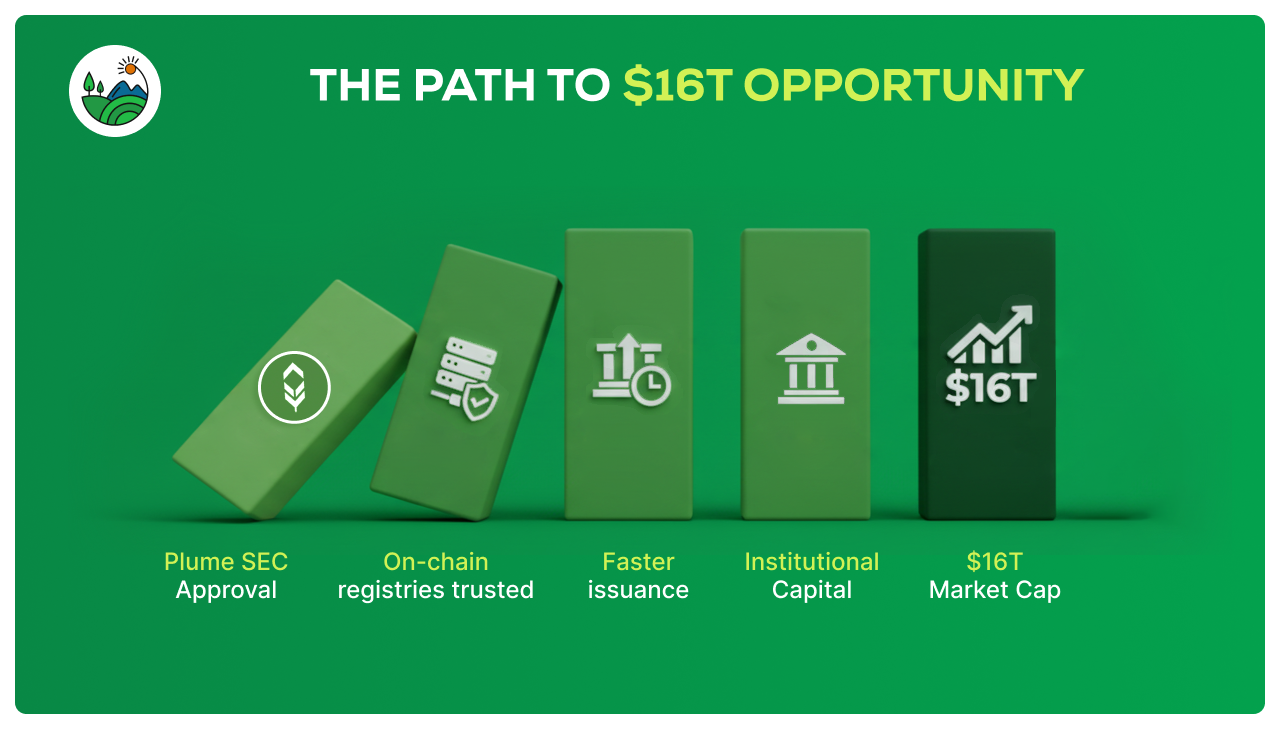
If these estimates can materialize in the days to come, RWA is well-positioned to be one of the largest markets in the world of modern finance.
Moreover, the external conditions are favoring this industry. Governments and regulators worldwide are creating proper frameworks. For instance, Asia-Pacific markets are running pilots for digital bonds and crafting standardized rules for security tokens.
These developments and the excitement of retail investors in this category build confidence that the $16T opportunity is actually very real.
How Will Landshare Benefit From This?
Landshare stands at the forefront of benefiting from this opportunity because of its early entry and real-world utility. This is very important as institutions seek new projects that have use cases that can help them capture a considerable market share.
Moreover, Landshare already operates as a compliant RWA platform. For instance, each Landshare RWA Token (LSRWA) is a security token representing fractional shares of a U.S. real estate portfolio, and buyers must pass KYC/AML checks.
The fact that regulators are now approving on-chain transfer agents shows the industry’s efforts are finally paying off. Here are some more factors that can help Landshare be one of the top RWA contenders:
1. Regulatory Credibility: Plume’s SEC status essentially means that tokenized securities can operate within established rules. Landshare’s approach aligns with these principles. So, investors can be assured that their projects sit within a legal framework designed to protect shareholders.
2. Investor Confidence: Every step toward clear regulation lifts confidence. The recently passed GENIUS Act, the SEC’s staff statements on liquid-staking, and the Trump administration’s overall outlook towards the crypto market have been fairly positive.
Similarly, Plume being approved as a SEC-registered blockchain transfer agent tells retail and institutional investors that projects like Landshare aren’t mere experiments. They’re rather a part of a regulated financial evolution.
Moreover, it means regulators see value in on-chain tokens, and that kind of signal helps legitimize the space Landshare operates in.
3. Landshare’s Own Progress: Landshare isn’t about hype. It is rather focused on delivering value from day one. The project has already sold four houses on the BNB chain. It is also providing consistent rental returns to the investors in its properties.
Moreover, the team remains focused on delivering stable, compliant returns from real estate growth.
Conclusion
So, now we know that the recent news was about more than just Plume Network being approved by the SEC to be a transfer agent. It rather has a much bigger impact on the RWA market as a whole.
While the industry continues to grow, for Landshare, it is the right time to innovate further and add more value to consumers’ lives.






